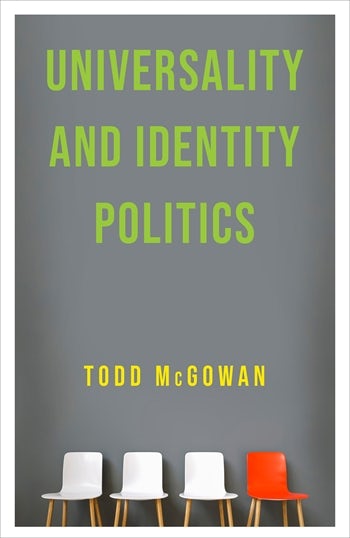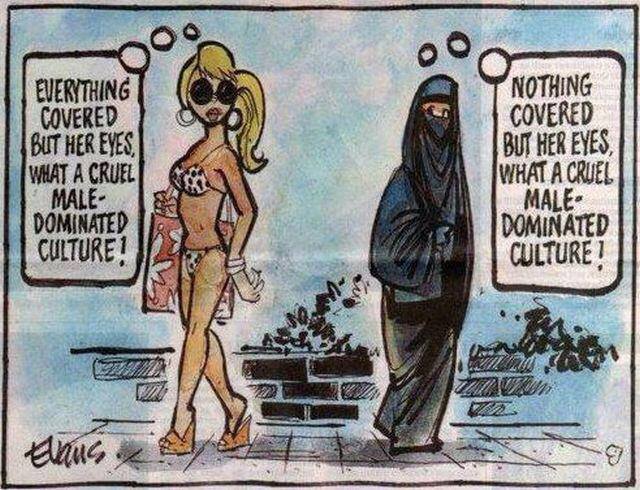Recent Forum Topics › Forums › The Public House › Excellent book: Universality and Identity Politics
- This topic has 4 replies, 2 voices, and was last updated 3 years, 4 months ago by
 Billy_T.
Billy_T.
-
AuthorPosts
-
December 31, 2020 at 12:02 pm #126198
 Billy_TParticipant
Billy_TParticipant
Almost finished with this philosophical look at political ideology, capitalism, psychoanalysis, culture, etc. It’s another of those “must-reads” for leftists, IMO.
McGowan makes an excellent case for why the left has been mistaken about the topics of the title — at least after WWII — and the right has always been wildly wrong about them. He basically says the real difference between left and right is universality versus particularism . . . with the former being our essential emancipatory project and the latter being the endless struggle against this.
Along the way, he takes a thorough look at definitions, re-definitions and mistaken definitions of universals, particulars, identity politics and so on. Brings in key thinkers, past and present. So much resonance for me, with all of it . . .
He’s especially good on Nazism and the horrible mistake of thinking of it in non-political terms, as some kind of abstract evil that can never be repeated. It can. It is being repeated as we speak. Its indentitarian core of nationalism, ethnicity and religion is still the (trifecta) core of reactionary politics . . . and though McGowan rarely mentions current events (or current leaders), it’s easy to see Trump and the political right as echoing all too much of it, now, today.
Borrowed this in ebook form from the library. Loved his previous study of Hegel, which I mentioned earlier.
Link for the book and a brief note on the author:
http://cup.columbia.edu/book/universality-and-identity-politics/9780231197700
About the Author
Todd McGowan is professor of film studies at the University of Vermont. His previous Columbia University Press books are The Impossible David Lynch (2007), Capitalism and Desire: The Psychic Cost of Free Markets (2016), and Emancipation After Hegel: Achieving a Contradictory Revolution (2019). He is the coeditor of the Diaeresis series at Northwestern University Press with Slavoj Žižek and Adrian Johnston.
December 31, 2020 at 1:58 pm #126207 znModerator
znModeratorI got this from the amazon description.
Todd McGowan argues that universals such as equality and freedom are not imposed on us
I’m sure it’s a good and interesting book, but–I get a strawman quality from that statement right there.
Who says “equality” and “freedom” are “universals” that are “imposed on us”?
The entire concept of rights says that by virtue of simply being human and living as a social being among other people, we all have rights. All of us, regardless (though they can be limited as a consequence of being legally and fairly convicted of committing crimes against others.)
(Though admittedly the word “equality” harbors all sorts of sneaky issues, some real and some not, but then saying we are all as human beings equally endowed with rights? Who besides right-wingers and fascists disputes that?)
I don’t think that that stuff has much to do with the philosophical questioning of humanist universals. As I understand this stuff, that’s a completely different and unrelated thing.
Human universals are tricky cause we are genetically determined to be culture bearing animals, and cultures differ throughout history and across the globe. Like the cartoon I post below demonstrates. And that makes many humanist universals tricky.
But I don’t think anyone disputes the idea that all human beings have or deserve to have rights.
Anyway the cartoon. It’s a well known one.
 December 31, 2020 at 4:58 pm #126213
December 31, 2020 at 4:58 pm #126213 Billy_TParticipant
Billy_TParticipantIt’s difficult to do the book justice in short summaries, primarily because he develops his arguments over time, and I’ve noticed that these developments sometimes overturn what I assumed he meant at earlier points along the way. He cites and quotes dozens of key thinkers to build his case, left, right and center, so I’d bet you’d eventually be on the same page — regarding the possible strawman and much else.
Anyway, your quote, I’m guessing, comes from the book blurb which I posted. It reads in full:
The great political ideas and movements of the modern world were founded on a promise of universal emancipation. But in recent decades, much of the Left has grown suspicious of such aspirations. Critics see the invocation of universality as a form of domination or a way of speaking for others, and have come to favor a politics of particularism — often derided as “identity politics.” Others, both centrists and conservatives, associate universalism with twentieth-century totalitarianism and hold that it is bound to lead to catastrophe.
This book develops a new conception of universality that helps us rethink political thought and action. Todd McGowan argues that universals such as equality and freedom are not imposed on us. They emerge from our shared experience of their absence and our struggle to attain them. McGowan reconsiders the history of Nazism and Stalinism and reclaims the universalism of movements fighting racism, sexism, and homophobia.
He demonstrates that the divide between Right and Left comes down to particularity versus universality. Despite the accusation of identity politics directed against leftists, every emancipatory political project is fundamentally a universal one — and the real proponents of identity politics are the right wing. Through a wide range of examples in contemporary politics, film, and history, Universality and Identity Politics offers an antidote to the impasses of identity and an inspiring vision of twenty-first-century collective struggle.
Right now, am in a very interesting section about BLM and the reactionary response to that . . . McGowan makes a great case for the former being universalist, and the latter, particularist, which echoes back to an earlier section on the Haitian Revolution.
Basically, the conservative accusation that the left is mired in “identity politics” is a projection/confession scenario. McGowan sees “identity politics” as fundamentally a right-wing project, the term misused, misapplied, etc. etc.
Identity formation needs external limits and “othering” to various degrees. When it hits the point of identity politics, it needs enemies. A true “universalist” project can’t have them. Potential converts, yes. Enemies, no. That’s another way McGowan thinks the left and right are so different.
More anon . . .
December 31, 2020 at 5:27 pm #126214 znModerator
znModeratorBasically, the conservative accusation that the left is mired in “identity politics” is a projection/confession scenario. McGowan sees “identity politics” as fundamentally a right-wing project, the term misused, misapplied, etc. etc.
Identity formation needs external limits and “othering” to various degrees. When it hits the point of identity politics, it needs enemies. A true “universalist” project can’t have them. Potential converts, yes. Enemies, no. That’s another way McGowan thinks the left and right are so different.
Yeah okay, interesting.
December 31, 2020 at 7:18 pm #126216 Billy_TParticipant
Billy_TParticipantJust finished it.
So many lights went on throughout the reading process. But I think I must be getting old, because in each moment, I thought I’d remember all the insights and details, the thinkers mentioned, the rationales, retain these moments, but I really haven’t. Should have taken notes!!
And it’s not that long a book!
Anyway, he’s definitely on Team Leftist. Very strong critique of capitalism, which he eviscerates. He knows his Marx, too, it would appear, and the Frankfurt School as well. Seems to be a friend of Zizek’s, and speaks highly of Alain Badiou and the Fields sisters, among others. Too many citations to list. Good notes, references, websites, etc
Gonna try to contact him for my own website. He teaches at the University of Vermont. Maybe Nittany knows him?
-
AuthorPosts
- You must be logged in to reply to this topic.

